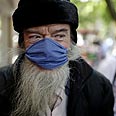
The Health Ministry has announced that four patients who were admitted to various hospitals throughout the country on suspicion that they had contracted swine flu tested negative for the disease. There are currently no suspected cases in Israel.
One of the patients who was found free of the disease is a 5-year old girl from Moshav Geulim, who was admitted to the hospital on suspicion of having caught swine flu from her uncle, Tomer Vajim.
Following the announcement the kindergarten attended by the girl is to remain open Thursday, despite orders given previously to cancel school on that day.
The Health Ministry has prepared a document instructing civilians on what to do if they have come into contact with someone who may be ill with the disease. The instructions include avoiding public gatherings and the workplace and washing regularly, a ministry official said.
The ministry has also updated its criteria for diagnosing swine flu. Doctors were previously told to look for two symptoms of a list of four, and are now being ordered to look for one out of five.
The symptoms include fever, runny nose, throat ache, cough, and shortness of breath in anyone who has visited Mexico since March 1, or has since been in contact with anyone who visited the country.
Israelis traveling abroad were advised to refrain from traveling from crossing international borders if they felt ill, and to seek medical treatment immediately.
Deputy Defense Minister Matan Vilnai on Wednesday ordered fliers instructing the public on swine flu to be handed out to anyone entering Israel's borders, beginning Thursday.
According to the instructions on the fliers, anyone feeling ill should report immediately to a nearby hospital.
WHO announces Phase 5 alert
The World Health Organisation on Wednesday raised the global flu alert level to 5, the second highest phase that indicates "a pandemic is imminent".
"I have decided to raise the level of influenza pandemic alert from phase 4 to phase 5," WHO Director-General Margaret Chan told a news briefing about the swine flu outbreak.
According to the WHO's pandemic flu response guidelines, a Phase 5 alert is called when there is sustained human-to-human spread of the virus in at least two countries in one region.
"While most countries will not be affected at this stage, the declaration of Phase 5 is a strong signal that a pandemic is imminent and that the time to finalise the organization, communication and implementation of the planned mitigation measures is short," the document reads.
Chan's move followed intensive consultations with experts and analysis of the spreading virus within and from Mexico.
The change in level puts governments on alert about the need to stockpile antiviral drugs such as Roche Holding AG 's Tamiflu and GlaxoSmithKline's Relenza, and accelerates pharmaceutical industry efforts to create a vaccine to fight the swine flu strain.
The higher alert also signals the virus is unlikely to fade away, and could pose a prolonged public health threat.
"It is something here to stay. Now the question is at what level it will be circulating and how easily it is transmitted," one public health expert said.
Earlier the US's Centers for Disease Control and Prevention reported at least 91 confirmed cases of the influenza in 10 states. A 23-month ol infant was killed by the flu in Texas. In Mexico, 159 people were reported dead from the outbreak.
Meanwhile the first case of swine flu contracted by someone who had not been to Mexico was reported in Spain. El Mundo later said on its website that the patient had been in contact with someone recently returned from the country.
Raanan Ben-Zur, Hanan Greenberg, AP, and Reuters contributed to this report















